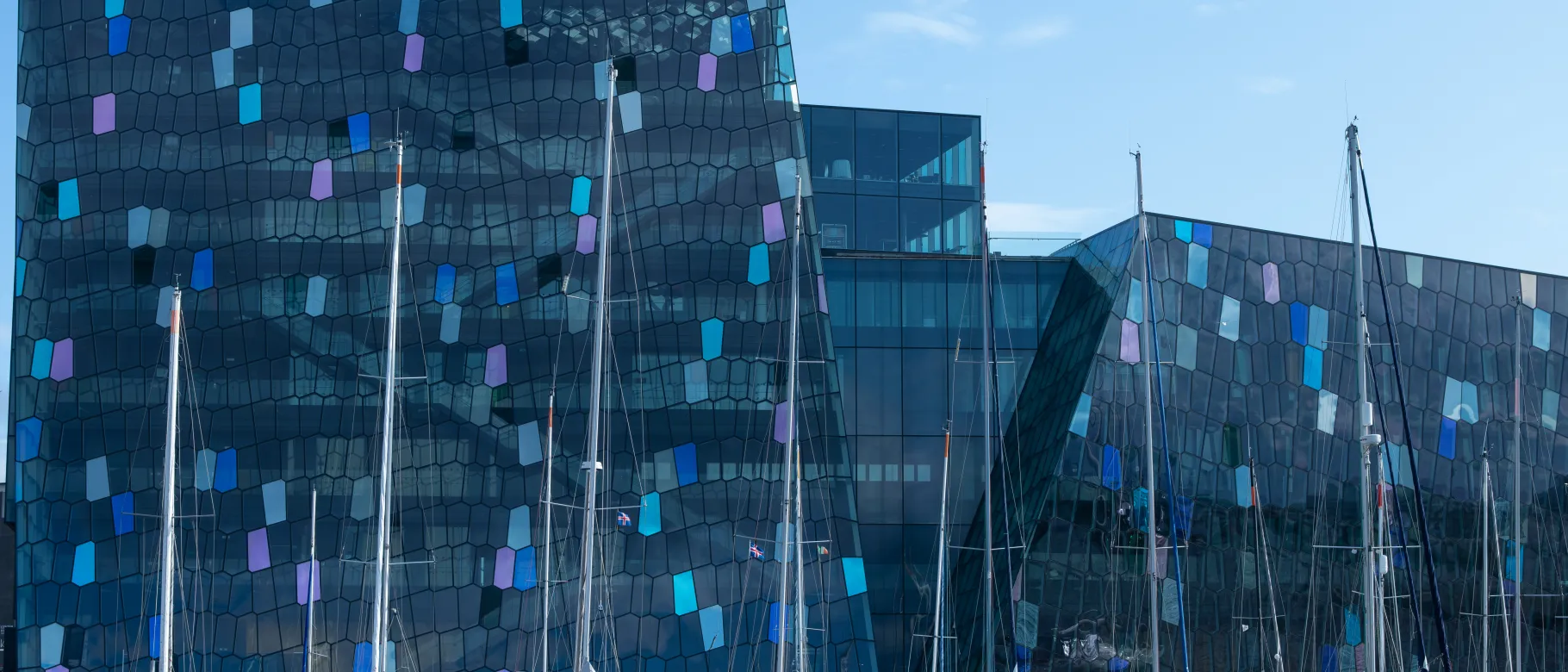Making new connections and exploring partnerships at the Arctic Circle Assembly in Iceland

Looking out the large glass windows that form a wall around the Harpa Conference Center in Reykjavík, Iceland, you can see waves crashing against the rocky coastline. It is similar to what you would see in Maine.
“Maine looks so much like these Nordic countries,” commented Joshua Hamilton, Ph.D., provost and senior vice president for Academic Affairs. “We're about the same size as Iceland, and we have had the same basic economies, historically. We also have this close connection to both the mountains and the sea.”
Maine is more than 2,300 miles away from Iceland, but we share many things in common, including picturesque coastlines, stunning natural beauty and long, cold winters.
“The climate presents certain hardships, and it creates a sense of character within the people of Iceland of being resilient – highly resilient and highly innovative,” stated James Herbert, president of UNE. “Of course, we see this in Maine as well.”
A delegation from UNE recently joined more than 2,000 people from 60 countries at Harpa for the annual Arctic Circle Assembly (ACA).
“Prime ministers are walking these hallways with major business leaders, academics who've been working in the Arctic for their whole career, and students,” explained Barry Costa-Pierce, Ph.D., executive director of UNE NORTH: Institute for North Atlantic Studies. “It's a wonderful eclectic mix.”
The gathering brings these people together to strengthen our economies, make advances in science and technology, meet the challenges of the future, share ideas, form partnerships and solve common problems.
Maine and these North Atlantic countries share more than just geographic and environmental similarities. Their populations also struggle with addiction, suicide and the difficulty of aging in rural areas.
“A common theme at this conference is these problems are really complicated, and no one discipline can tackle them,” explained Hamilton. “No one group or country can tackle them. It really takes a concerted effort”
Members of the UNE delegation gave four presentations over the three-day event. For the first time at the conference, the University engaged in social issues. Master of Social Work student Suzanne Fox and her daughter Julia Hansen gave a presentation on teenage suicide. Shelley Cohen Konrad, Ph.D., LCSW, FNAP, director of the School of Social Work, took part in a group presentation on aging. Both issues impact Maine and Iceland in similar ways.
“People are affected by the environment, the climate they’re in and by the economy,” Konrad said. “They're affected by all of those pieces, and all of them affect mental health and mental wellness.”
While in Iceland, Konrad met off-site with several mental health providers from Nordic countries.
“To see how we can collectively work together on common issues, across our countries and across our state, we have to bring this to a larger level of conversation,” she said.
The presentations at the conference are a jumping- off point for more meaningful conversations in the Harpa hallways.
“We do as much business in the hallways here as we do in the formal sessions,” Hamilton stated. “It's the place where you make these connections on a very human, personal level. We do our best work when we meet each other, talk to each other and share ideas.”
Costa-Pierce added, “It starts with these extraordinary local discussions that transform immediately into global talks. Invariably you'll hear people say we're dealing with the same issues, and you start to form learning communities.”
At this year’s ACA, President Herbert signed a Memorandum of Understanding to collaborate with the University of Gothenburg in Sweden. Talks were also held for possible partnerships between UNE and Highlands and Islands Enterprises in Scotland, the University of Iceland and Reykjavík University.
“By pooling our resources in knowhow and curriculum we can provide much better services to our students and community than we could independently,” said Ari Kristinn Jónsson, president of Reykjavík University. “We felt this connection with UNE from the very first day that we started talking together. We can gain a great deal from sharing.”
As Maine’s ties to countries in the Arctic grow, so will UNE’s presence at the ACA, bringing new subjects and participants into the conversation.
“UNE is clearly a player in this space and is recognized as an institution that is on the move, growing and looking to deepen our partnerships across this area,” said Herbert.
UNE has developed a solid reputation at the ACA—not just as a participant but as a leader.
“I have to give the University of New England, and everybody in Maine, a great deal of credit for not just attending and being part of the Arctic circle, but driving forward a lot of the discussion, bringing ideas to the table and getting others on board,” commented Jónsson.
This year’s conference wrapped up after three days in Reykjavík, but the conversations started here will continue across countries until the participants meet again in Iceland next year.